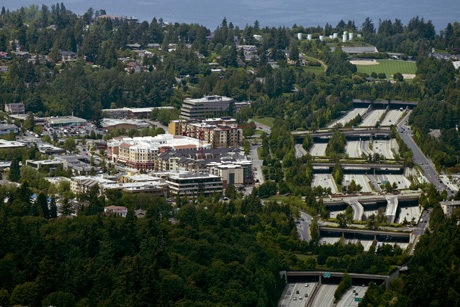At the ballot box, Islanders have long supported the expansion of transit and other initiatives regarding improving regional transportation. Yet any move that might somehow restrict access to I-90, either through tolls or lane configurations, instantly sets off alarms here.
I-90 casts a long shadow across the Island. There is a love-hate relationship between Islanders and the bridge they depend on. The quality of life here includes the ability to get on and off the Island easily. City officials are keenly aware of the importance of access to the interstate.
Access as well as new transportation initiatives regarding transit, tolling and more are part of the focus of a special section, “Navigate the Future,” that readers will see today in their copy of the Mercer Island Reporter.
In the past, Islanders would rather have kept the highway out of sight and out of mind. Back in the 1970s, the City Council led by Aubrey Davis and Ben Werner fought to contain the size and impact of the expansion of I-90. The machinations born in 1976 and articulated in an agreement, called the “Memorandum of Understanding” (MOA), stipulated that residents would be granted special access due to Mercer Island’s watery isolation from Seattle and points east. More than 30 years later, the MOA remains a point of reference. It begat another agreement in 2005 between the King County cities to preserve special access to Islanders in light of new lane configurations that were proposed. Now, as the region approaches the next level of projects to expand and enhance the transportation network — and replace dangerous parts of that network— such as the SR-520 bridge, the Island again finds itself defending its rights.
As regional officials reached consensus about the need for its replacement, the focus turned once more to the I-90 bridge not as a back-up conduit connecting the east and west side — but as another way to fund a new SR-520.
Studies in 2008 estimated that if I-90 were tolled at the same time as the northern bridge, more money would be raised faster — meaning the new bridge might be funded and built sooner.
Initially, it was thought that tolling on SR-520 could shift a significant amount of congestion to I-90. Within that context, the City Council held the tacit understanding that tolling along the interstate in some form to relieve congestion on the bridge would be necessary. Islanders would receive some sort of relief from regular tolls to recognize the unique position that residents have here.
But according to Island Mayor Jim Pearman, the Council took a wait-and-see attitude and deferred its final judgment until more analysis had been done. After data on traffic flows revealed that the amount of traffic shifting from SR-520 to I-90 would be minimal, the City Council reconsidered its view on tolling on the interstate here.
The Council has now taken the position that I-90 should not be tolled in order to pay for SR-520 because the bridges are not “connected.”
Pearman said that tolling is now a funding issue, not a congestion issue.
“We waited for the data to show what would happen to traffic on I-90 if 520 was tolled,” he explained. “It showed that it would not affect traffic on I-90 significantly. Since the bridges are not connected in that way, the issue becomes one of who should pay for 520,” he said.
“Tolling I-90 to help pay for SR-520 sets a dangerous precedent,” he continued. “It is bad policy to toll one asset to pay for another if they are not connected. It is arbitrary and unfair.”
State officials announced last week that tolling on the highway 520 bridge has been delayed until as late as June 2011. It was to have begun in October 2010.
Tolling I-90 to help pay for SR-520 remains an option.
The federal government which controls the highway stated earlier that it would not oppose tolling on I-90.


